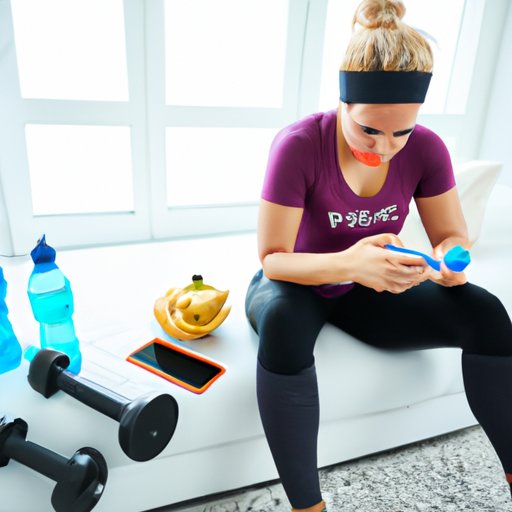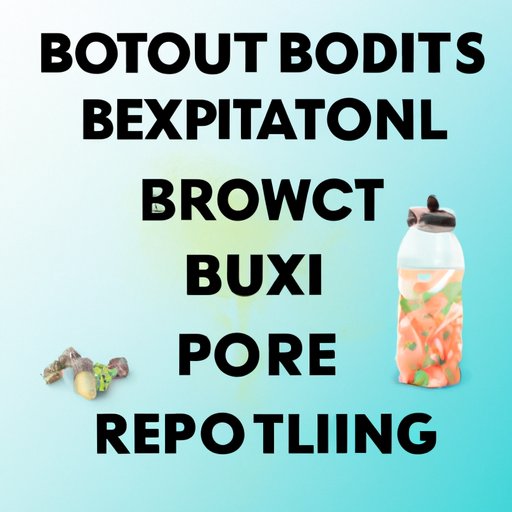Introduction
We’ve all experienced it before: the uncomfortable feeling of bloating and fullness after a workout. Whether you’re a casual exerciser or an elite athlete, post-workout bloating is a common issue that can prevent you from reaching your fitness goals. So, why do we bloat after working out and what can we do about it? In this article, we’ll explore the science behind post-workout bloating, how working out can make you more prone to bloating, why you shouldn’t ignore that post-exercise bloating feeling, and strategies for reducing post-workout bloating.
The Science Behind Post-Workout Bloating: What Causes It and How to Avoid It
Post-workout bloating is caused by a variety of factors, including dehydration, electrolyte imbalances, food intolerances, and digestive issues. These factors can contribute to bloating and fullness in different ways. For example, dehydration can cause fluid retention, while electrolyte imbalances can lead to bloating due to the body’s inability to properly digest carbohydrates. Food intolerances can also cause bloating as the body struggles to process certain foods.
To reduce the risk of post-workout bloating, it’s important to focus on hydration, nutrition, and proper digestion. Start by drinking plenty of water before, during, and after your workout. This will help keep your body hydrated and prevent dehydration-related bloating. Additionally, pay attention to your pre- and post-workout nutrition. Be sure to eat a balanced meal with plenty of complex carbohydrates, healthy fats, and lean proteins. This will provide your body with the energy it needs to perform at its best and help reduce the risk of bloating due to poor digestion.
How Working Out Can Make You More Prone to Bloating
Working out can make you more prone to bloating for a number of reasons. The intensity and duration of exercise can affect how your body responds to physical activity. If you’re pushing yourself too hard or exercising for too long, you may be more likely to experience bloating. Additionally, dehydration can play a role in post-workout bloating. When you sweat during a workout, you lose electrolytes and water. If you don’t replace these fluids, your body may respond by retaining water, which can lead to bloating.
Why You Shouldn’t Ignore That Post-Exercise Bloating Feeling
It’s important to pay attention to any bloating or fullness you experience after a workout. While it could be a simple case of dehydration or poor nutrition, it could also be a sign of an underlying health issue. For example, if you’re experiencing abdominal pain or discomfort along with bloating, it could be a sign of a medical condition such as irritable bowel syndrome (IBS) or celiac disease. If you’re concerned about your post-workout bloating, it’s important to speak to your doctor to rule out any serious medical issues.
Pre- and Post-Workout Nutrition Tips to Avoid Bloating
Eating the right foods before and after a workout is key to avoiding post-workout bloating. Before a workout, focus on eating complex carbohydrates and lean proteins. This will give your body the energy it needs to perform at its best. After a workout, aim to refuel with a combination of carbohydrates and proteins. This will help replenish your body’s energy stores and prevent bloating due to poor digestion.

What to Do When You Feel Bloated After a Workout
If you find yourself feeling bloated after a workout, there are a few steps you can take to help relieve the symptoms. First and foremost, make sure you’re properly hydrated. Drink plenty of water and electrolyte-rich drinks like coconut water to help replenish fluids lost through sweat. Additionally, consider making some dietary changes. Cut back on processed foods, sugar, and dairy, as these can all contribute to bloating. Finally, try some relaxation techniques like yoga or meditation to help relax your digestive system.
Strategies for Reducing Post-Workout Bloating
In addition to the tips mentioned above, there are a few other strategies you can use to reduce post-workout bloating. Regular stretching and massage can help relieve tension in the abdomen and improve digestion. Additionally, digestive enzyme supplements can help break down food more efficiently and reduce bloating. Lastly, some people find relief from bloating with herbal remedies like peppermint and ginger. As always, be sure to talk to your doctor before taking any supplements or herbal remedies.
Conclusion
Post-workout bloating is a common problem that can prevent you from achieving your fitness goals. By understanding the science behind post-workout bloating, you can take steps to reduce the risk of bloating and enjoy your workouts without feeling uncomfortable. Focus on proper hydration, nutrition, and relaxation techniques to help reduce bloating. And if you’re still having trouble, don’t hesitate to speak to your doctor. With the right strategies in place, you can get back to feeling your best.
(Note: Is this article not meeting your expectations? Do you have knowledge or insights to share? Unlock new opportunities and expand your reach by joining our authors team. Click Registration to join us and share your expertise with our readers.)
